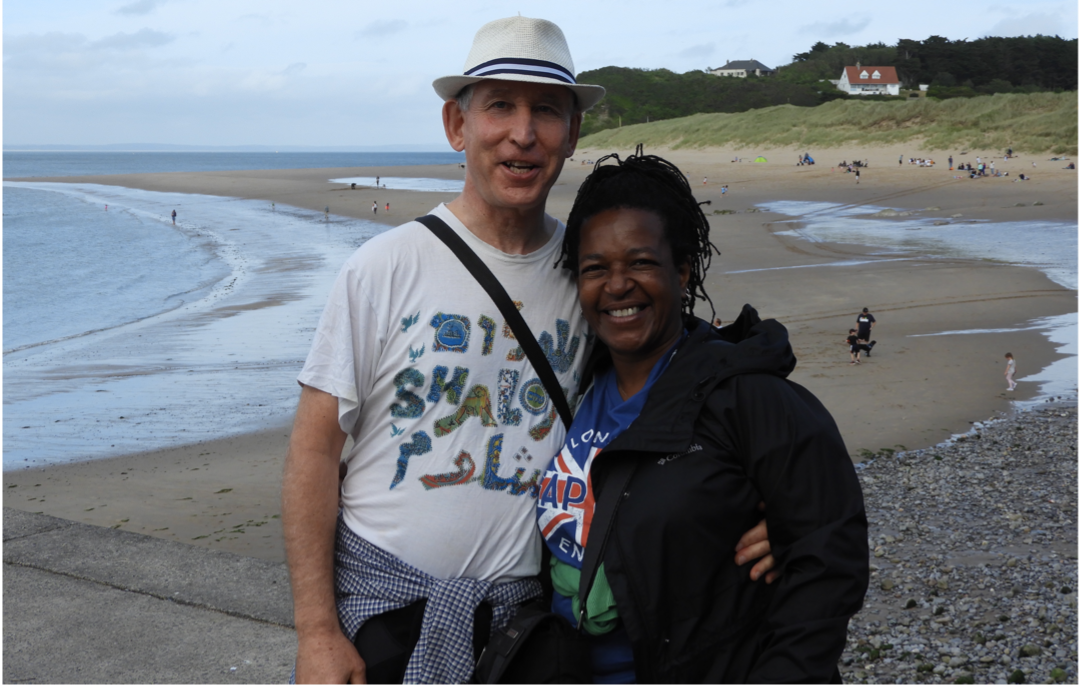The following story is written by Sharon’s husband, Roger.
Sharon’s first symptom of CJD was not being able to sing in tune. She sang and led singing in church, sang along to loud music at home and studied music at university at age 50, with her voice as her instrument. Once, she bust out an opera aria whilst waiting for our bread to be sliced at Sainsbury’s.
Sharon first noticed her impaired singing at the funeral of her beloved pastor of 27 years, Joe. He had been her mentor and great safe father figure. Joe had battled cancer for a couple of years and, following a notable remission a few months before, he died 10 days into June 2021. Sharon’s CJD following Joe’s death so quickly seemed to me then, and seems still, no coincidence.
At the funeral, Sharon noticed she could no longer sing in tune. Shortly after, she found that music became a random, disjointed and unpleasant series of sounds. She had telephone appointments with her GP which resulted in referral to an ENT specialist. For the rest of July and August, Sharon was 80% fit. She enjoyed the break from her job teaching in a Secondary School and we had a good summer, travelling to Cardiff and Tenby, Norwich and Cambridge.
Sharon was always lively and confident, bright in mind and demeanour. Her students knew her as lively and happy, as well as strict. However, she could also be more afraid of some things than she needed to be. She recognised this in herself and paid it little attention. Without Joe, Sharon seemed more fearful – life was more scary.
By late August, Sharon felt worse. She was often nauseous. Car journeys were difficult. She could not drive. She was tired. She was more irritable, like a teenager. She knew something was seriously wrong and tried to see a doctor by calling an ambulance to be taken to A&E. A long wait only led to confirmation that she needed to see an ENT specialist.
Sharon could not cope with her first, teacher training, day back at school in September. In the afternoon, she was withdrawn and exhausted, and an ambulance was called. Another long wait in A&E led to the same result.
Following this, Sharon deteriorated quickly. She seemed to regress in age, becoming more childlike, and even more fearful. In mid-September she asked a good friend, Janet, to come and see her. Janet was surprised when Sharon did not offer her a cup of tea, their routine beginning. Instead, Sharon said ‘Would you like a sweetie?’.
A week later Sharon was talking, eating and walking like a toddler, with intermissions of adult clarity. At last, we managed to have her doctor see her rather than talk on the phone. She was admitted to hospital a couple of days later. An alert admissions doctor recognised the possibility of CJD and ordered a lumbar puncture. Soon, the doctors said they had ruled out much else and were convinced she had CJD. We were told she might die before the results of the lumbar puncture were back.
One evening, when I was about to leave her in hospital, Sharon pulled herself up on her bed, swung her legs over the side and stood up, all with a little support. At this time, she had stopped drinking. She tapped her foot on the floor and looked at me. Her son and I knew she wanted to go home with me. ‘You’re not well enough to come home,’ I had to say, with great sadness. ’While you are not drinking. you will have to stay here.’
The following week Sharon had waves of intense movement and emotional expression. Doctors told me these were random expressions of a brain shutting down, but they felt different to me.
One night I sat up with her. In the early morning, Sharon went through a wave of fear, followed by a wave of sadness, followed by a wave of terror, followed by a wave of laughter, followed by a wave of quieter anguish. Each wave would build and then die down. Through them all, Sharon looked intently into my eyes. I felt she was communicating intense emotion to me, in sounds and movements rather than words. She had had a traumatic childhood and the child-like emotions she seemed to express fitted with the regression we had witnessed. I prayed with her often. Healing, peace, seemed to come.
Sharon was hyper-sensitive to touch and we all agreed on sedating her for her daily bed wash. The medical team, and other family members, considered that continuous sedation was appropriate for managing Sharon’s waves of emotion. This was the ultimate decision, though my experience was that the waves died down by themselves and Sharon had long periods of natural, rather than sedated, peace. The Consultant Neurologist once noted how good the peace felt to her.
On the Sunday at the end of another week, Sharon’s sedative had run out and she had had an unexpected break from the sleepy medication. Shortly after the sedative was re-started, a couple of friends came and we prayed together. They left and another friend came. Sharon jerked up her right arm and pointed towards her mouth. After the second time, I decided to try offering her water in a cup. Sharon drank. Her lips were not in full control and 30% of the water ran down her chin and neck. But she was drinking for the first time in a good 2 weeks! I thought milk would build her up more and our friend went to buy some from the hospital shop. When I brought the cup of milk to her mouth, Sharon’s lips remained tight shut.
When I offered the water again, she drank again. After a while, Sharon sank into sleep, sedated again. Unfortunately, the doctors were not there to see Sharon’s deliberate, conscious movement before the sedative had taken effect again and they did not believe what I reported.
A couple of days later I was alone with Sharon. She raised her right arm again, pointing at the ceiling. She looked up with rapture. She tried to lift herself. She had sometimes looked up like this when leading worship and feeling close to heaven.
I panicked. Sharon might be telling me she wanted to go to heaven. How could I say ‘Yes’ when it was the last thing I wanted, and how could I say ‘No’ if it was what she wanted? I pretended I did not understand. A day or so later, Sharon gestured up in the same way. I regret that I held to my same pretence. I did let her know, in other ways, that I wanted her to stay with me.
About four days later, at the end of a quiet hospital Monday, Sharon’s breathing changed from a little tight to laboured. I prayed for her and she let go of life, on her way to Paradise.
– Roger Harper-Allen
The CJD Support Network would like to thank Roger for sharing his story. Roger has offered for anyone with similar experiences in some way to his to be in touch with him if they would like to speak with him. If you would like to be put in touch with Roger, please contact us.


